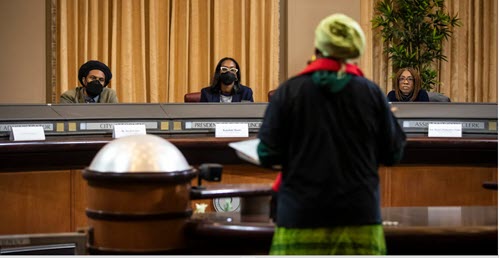Abstract
Excerpted From: California Task Force, Appendix California Task Force: Executive Summary, 60 San Diego Law Review 613 (August-September, 2023) (237 Footnotes) (Full Document)
 In 1863, Abraham Lincoln signed the Emancipation Proclamation, and, in 1865, the 13th Amendment to the U.S. Constitution commanded that “[n]either slavery nor involuntary servitude ... shall exist within the United States.” In supporting the passage of the 13th Amendment, its co-author Senator Lyman Trumbull of Illinois said that “it is perhaps difficult to draw the precise line, to say where freedom ceases and slavery begins ...” In 1883, the Supreme Court interpreted the 13th Amendment as empowering Congress “to pass all laws necessary and proper for abolishing all badges and incidents of slavery in the United States.”
In 1863, Abraham Lincoln signed the Emancipation Proclamation, and, in 1865, the 13th Amendment to the U.S. Constitution commanded that “[n]either slavery nor involuntary servitude ... shall exist within the United States.” In supporting the passage of the 13th Amendment, its co-author Senator Lyman Trumbull of Illinois said that “it is perhaps difficult to draw the precise line, to say where freedom ceases and slavery begins ...” In 1883, the Supreme Court interpreted the 13th Amendment as empowering Congress “to pass all laws necessary and proper for abolishing all badges and incidents of slavery in the United States.”
However, throughout the rest of American history, instead of abolishing the “badges and incidents of slavery,” the United States federal, state and local governments, including California, perpetuated and created new iterations of these “badges and incidents.” The resulting harms have been innumerable and have snowballed over generations.
This interim report is a general survey of these harms, as part of the broader efforts of California's Task Force to Study and Develop Reparations Proposals for African Americans (Reparations Task Force). The Reparations Task Force was established under Assembly Bill 3121 (S. Weber) in 2020 and a report of the Task Force is due to the Legislature by June 1, 2022. A final report will be issued before July 1, 2023. The law charges the Reparations Task Force with studying the institution of slavery and its lingering negative effects on society and living African Americans. The law requires the Reparations Task Force to recommend appropriate remedies of compensation, rehabilitation, and restitution for African Americans with a special consideration for descendants of persons enslaved in the United States. This executive summary synthesizes many of the preliminary findings and recommendations of the Reparations Task Force.
So thoroughly have the effects of slavery infected every aspect of American society over the last 400 years, that it is nearly impossible to identify every “badge and incident of slavery,” to include every piece of evidence, or describe every harm done to African Americans. In order to address this practical reality, this interim report of the Reparations Task Force describes a sample of government actions and the compounding harms that have resulted, organized into 12 specific areas of systemic discrimination.
In order to maintain slavery, government actors adopted white supremacist beliefs and passed laws to create a racial hierarchy and to control both enslaved and free African Americans. Although the U.S. constitution recognized African Americans as citizens on paper, the government failed to give them the full rights of citizenship, and failed to protect--and often sanctioned or directly participated--African Americans from widespread terror and violence. Along with a dereliction of its duty to protect its Black citizens, direct federal, state and local government actions continued to enforce the racist lies created to justify slavery. These laws and government supported cultural beliefs have since formed the foundation of innumerable modern laws, policies, and practices across the nation.
Today, 160 years after the abolition of slavery, its badges and incidents remain embedded in the political, legal, health, financial, educational, cultural, environmental, social, and economic systems of the United States of America. Racist, false, and harmful stereotypes created to support slavery continue to physically and mentally harm African Americans today. Without a remedy specifically targeted to dismantle our country's racist foundations and heal the injuries inflicted by colonial and American governments, the “badges and incidents of slavery” will continue to harm African Americans in almost all aspects of life.
Cal. Task Force to Study & Develop Reparation Proposals for Afr. Ams., Interim Report Executive Summary (2022),


